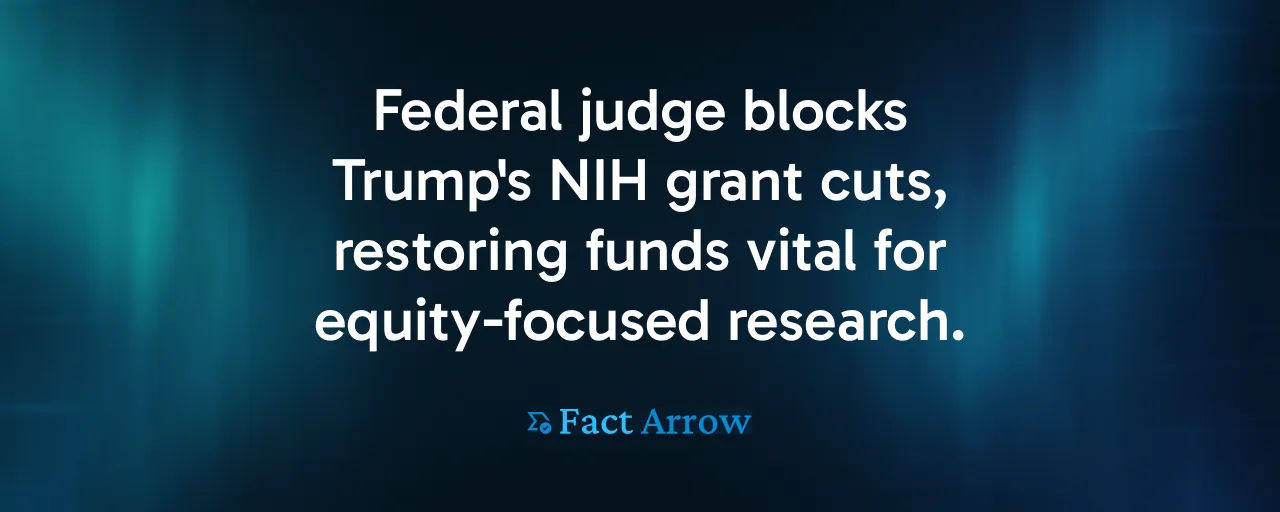A Victory for Science and Fairness
A federal judge has delivered a powerful blow to the Trump administration's efforts to slash National Institutes of Health (NIH) research grants. On June 16, 2025, U.S. District Judge William Young, a Reagan appointee, ruled that the administration's termination of funding in states like California was unlawful. The decision reinstates millions in grants, enabling universities to continue groundbreaking biomedical work. Why does this ruling resonate? It stands as a defense against policies that target vulnerable communities and undermine scientific progress.
California Attorney General Rob Bonta spearheaded the lawsuit, revealing the administration's systematic cancellation of grants linked to diversity, equity, and inclusion (DEI) or LGBTQ+ health research. Judge Young called the administration's actions a clear case of racial and anti-LGBTQ+ discrimination, unprecedented in his 40 years on the bench. Grounded in the Administrative Procedure Act, the ruling labeled the terminations 'arbitrary and capricious.' This victory affirms that federal agencies cannot bend to ideological pressures at the expense of public health.
The grants at issue support research on cancer, HIV, and health disparities, areas long prioritized by the NIH. The administration's executive orders, including the 2025 'Ensuring Lawful Governance,' froze approximately $9.5 billion in funding nationwide. For researchers, students, and patients, the cuts disrupted critical work without warning. The coalition of 16 states argued that the NIH's vague termination letters, citing shifts in 'agency priorities,' lacked any scientific or legal grounding.
Protecting Research That Serves All
The NIH drives U.S. biomedical innovation, with over 80% of its budget fueling research at universities and hospitals. Each dollar invested generates $2.56 in economic activity, powering discoveries like the rubella vaccine and HIV treatments. Yet, the Trump administration targeted studies on health equity, transgender care, and vaccine hesitancy, dismissing them as ideological. Such actions threaten communities who depend on this research for better health outcomes.
Public health advocates contend that defunding DEI-related research defies congressional mandates to tackle health disparities. Groups like the ACLU, through lawsuits such as APHA v. NIH, argue that these cuts violate due process and erode scientific trust. For instance, studies on transgender health, vital for addressing care gaps, were abruptly halted. Universities, including Harvard, have also sued, asserting that federal demands to alter curricula infringe on academic freedom. Politicizing science risks delaying treatments and weakening the research ecosystem.
The administration defends its actions by claiming DEI programs waste taxpayer funds and foster division. HHS officials prioritize 'gold-standard science' over what they label identity politics. However, Judge Young's ruling found no evidence that the canceled projects violated any laws. The decision bolsters efforts to shield federal research from political interference, emphasizing that science addresses the needs of all communities, regardless of White House agendas.
Echoes of Past Struggles
Federal policy has a long history of targeting marginalized groups. The 1953 Lavender Scare expelled LGBTQ+ workers from government, while the 1996 Defense of Marriage Act denied same-sex couples federal benefits. Recent policies revive this pattern. The Heritage Foundation's Project 2025, embraced by Trump officials, seeks to eliminate Title IX protections for LGBTQ+ students and restrict Title VII workplace safeguards. Its language appeared in a January 2025 executive order defining 'sex' as a fixed biological trait, undermining transgender rights.
Courts have historically curbed executive overreach. The 1952 Youngstown case limited presidential authority, and modern APA challenges ensure agencies follow legal mandates. Judge Young's NIH ruling upholds this legacy, faulting the agency for bypassing peer-review protocols. Yet, the administration's broader deregulation efforts, including orders to rescind rules misaligned with White House goals, promise more legal confrontations. These disputes will shape the balance of power and the future of equitable governance.
Anti-DEI policies extend beyond the NIH. February 2025 executive orders targeting federal contractors' diversity initiatives triggered lawsuits, with a Maryland court issuing a nationwide injunction. Although the Fourth Circuit paused that order, it cautioned that vague enforcement could violate constitutional protections. Meanwhile, congressional proposals for an 8% NIH budget cut and bans on diversity supplements embed anti-DEI rhetoric in funding debates, threatening the stability researchers need for long-term planning.
The Road Ahead for Research
Restoring NIH grants provides immediate relief, but the battle continues. The administration's planned appeal could prolong uncertainty, leaving researchers in limbo. The broader freeze of $11 billion in federal research grants across agencies threatens U.S. innovation. In April 2025, over 200 college presidents condemned funding cuts as attacks on academic freedom. Without action, these policies could diminish the nation's scientific leadership, especially as global competitors increase R&D investments.
Advocates for equitable health outcomes view the ruling as a reaffirmation of scientific independence. Academic leaders and organizations like Protect Democracy stress that peer review must remain free from ideological interference to ensure public health progress. The NIH case, alongside lawsuits challenging anti-DEI orders, signals a commitment to defending research autonomy. However, looming congressional budget fights underscore the need for sustained advocacy to protect funding for studies addressing systemic inequities.
Judge Young's decision offers hope for communities and researchers targeted by discriminatory policies. It underscores the judiciary's role in upholding fairness when agencies stray. As legal challenges unfold, the nation faces a decision: support science that benefits everyone or allow ideology to dictate progress. For now, Bonta's coalition has secured a crucial victory, ensuring that vital research can continue to improve lives.
